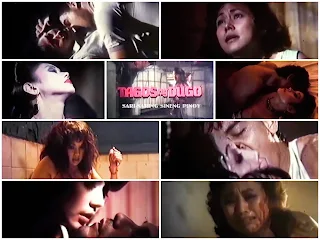Overused and much misused, the word provocative has become a double-edged sword, especially when swung in the direction of Filipino independent cinema. At its best, the genuinely provocative film, off the top of my head, shocks in order to expand our vision of the world it encompasses. At its most dispiriting, it's an exercise in cheap thrills, designed to goose a presumptively stuffy bourgeois audience while positioning a director as some sort of iconoclast and Jun Robles Lana has no such excuse. The characters in Your Mother's Son (The IdeaFirst Company, Octobertrain Films, Quantum Films, Cineko Productions, 2023), belong in their own isolated little world that is self-absorbed and irresponsible. Lana and co-screenwriter Elmer Gatchalian come to the conclusion that some people would prefer to spend their days with those who are much younger, abandoning their social responsibilities and families. This is a film that seems divorced from any moral sensibilities. Your Mother's Son needed serious judgment: someone to have a firmer opinion on these terribly unappealing characters. It lacks plausible psychology and context for the film’s characters and their love circle. The performances from some normally reliable talents do little to strengthen our sympathy and help us understand them. As Sarah, Sue Prado has the hint of a beautiful woman aging, unused to such desperation in her loneliness. She is truly enigmatic, delivering a surprisingly strong and powerful performance for a film and a screenplay this superficial. Elora Españo (Amy) can convey nuance and quiet intelligence even when seeming to do nothing in particular. Both Kokoy de Santos (Emman) and Miggy Jimenez (Oliver) are given terribly uninteresting and inexpressive roles, spending most of the film underserviced by flat dialogue. There’s no sign of coltishness in either De Santos' or Jimenez’s performances. These characters don’t inhabit the real world: they remain lodged in this seaside idyll from beginning to end and whenever an opportunity is presented for them to leave. Your Mother's Son is poorly paced and concludes with an ending that is frustratingly detached from comprehensible human behavior and personal responsibility. There's a germ of genuine transgression to be located in this three-way affair and it has to do with the overlap between maternal and carnal love. But it's less explored here than it is sidelined.
Your Mother's Son is incredibly hard to watch. It's a completely illusory and nonsensical film and is one that would benefit greatly had Lana not taken the material quite so earnestly. The film needed to play on the frivolous nature of the premise in order to work or alternatively go completely the opposite way. It’s a messed up situation and if handled with more conviction and devastation it could be really affecting, yet we don’t get a sense for the severity of the scenario nor the destructive implications. It lingers nonchalantly between the two notions making this entire situation seem almost normal. The movie tacks hard into self-serious waters, piling on the consequences. We don’t get into any of the characters’ heads either, though to be honest, there isn’t particularly much going on inside any of them. Lana manages the trick of making sex joyless. Like porn, he tops that by draining his film of variety and longing. Within that framework, Lana makes some serious missteps. He always had a fondness for these kind of highly symbolic, far-fetched stories, but he still feels the need to give his characters more mundane motivations, to make us like them. It’s an understandable miscalculation and let’s applaud these two insanely talented actresses for gamely lending real vulnerability to these broken creatures, but it’s a catastrophic one, because it threatens to bring Your Mother's Son into the real world, and that’s not a realm where this story can survive. This sort of thing threatens to make the movie about sex and as far as I can tell, that’s not what it's up to. There’s a potentially interesting attempt here to explore without judgment why older women might be drawn into relationships with much younger men. Physical pleasure, reassurance and unencumbered freedoms that often vanish over the course of conventional long-term unions. But the film sticks to the surfaces right up to the climactic exposure. That makes these characters not much more than irresponsible narcissists living in self-satisfied isolation. The movie wants it both ways. It asks not to be judged by standards of realism, but then tries to inject realism and naturalism into its absurdist narrative. One imagines what other directors who deal in similarly symbolic, hermetically sealed environments could have done with this material. Lana, for all his talent and ambition, doesn’t seem up to the task; in the end, Your Mother's Son doesn’t quite go far enough.
Sound Engineer: Allen Roy Santos
Music: Teresa Barrozo
Editor: Benjie Tolentino
Production Design: Roy Roger Requejo
Director of Photography: Moises Zee
Screenplay: Jun Robles Lana, Elmer Gatchalian
Directed By: Jun Robles Lana










